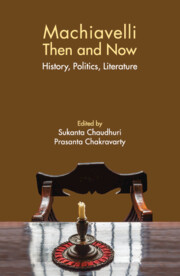15 - Machiavelli and Gandhi
Published online by Cambridge University Press: 21 January 2022
Summary
This chapter looks at two of the most radical political thinkers in human history, but their radicalism is on such dramatically opposite lines that any meaningful comparison seems unrealistic. Mohandas Karamchand Gandhi heads the list of iconic apostles of non-violence. Four centuries earlier, Niccolò Machiavelli had proposed violence in many guises, from open warfare to covert assassination, as the default mode of successful political strategy. For Gandhi, politics was inseparable from ethics, while Machiavelli placed the two in uneasy tandem at best. Gandhi never mentions Machiavelli in his writings, even to oppose or dismiss him. Nonetheless, I would like to explore a deeper paradigm where both might find a place.
When the Boer War broke out, Gandhi and his associates were faced with a political choice that was also a moral choice. Should the Indian community seize this opportunity to have their own back on the British by siding with the Boers? Many thought so, but Gandhi argued for supporting the British, and that actively by setting up an ambulance corps. In his words:
Our existence in South Africa is only in our capacity as British subjects. … And if we desire to win our freedom and achieve our welfare as members of the British Empire, here is a golden opportunity for us to do so… It must largely be conceded that justice is on the side of the Boers. But every single subject of a state must not hope to enforce his private opinion in all cases. The authorities may not always be right, but … it is [the subjects’] clear duty generally to accommodate themselves, and to accord their support, to acts of the state.
We have here an extraordinary mix of moral and political arguments, principles and pragmatism. Moreover, the moral factors are conflicting, as Gandhi believes the Boers to have justice on their side. Yet he would support the British, not only out of ‘clear duty’ but to serve the Indians’ own long-term interest. Of two moral alternatives, he chooses the one (arguably the less moral) that happens also to be the better tactical strategy. He was to advance the same justification for Indian participation in the First World War. Needless to say, he later rejected these arguments during India's independence movement, by which time he had challenged the identity of Indians as British subjects.
- Type
- Chapter
- Information
- Machiavelli Then and NowHistory, Politics, Literature, pp. 281 - 295Publisher: Cambridge University PressPrint publication year: 2022



